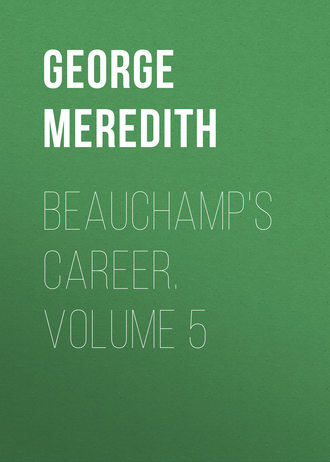
George Meredith
Beauchamp's Career. Volume 5
He replied that women must have it, just as men must have exercise.
'Old women, Nevil; intriguers, tattlers.'
'Young women, Renee.'
She signified no.
He shook the head of superior knowledge paternally.
Her instinct of comedy set a dimple faintly working in her cheek.
'Not if they love, Nevil.'
'At least,' said he, 'a man does not like to see the woman he loves banished by society and browbeaten.'
'Putting me aside, do you care for it, Nevil?'
'Personally not a jot.'
'I am convinced of that,' said Renee.
She spoke suspiciously sweetly, appearing perfect candour.
The change in him was perceptible to her. The nature of the change was unfathomable.
She tried her wits at the riddle. But though she could be an actress before him with little difficulty, the torment of her situation roused the fever within her at a bare effort to think acutely. Scarlet suffused her face: her brain whirled.
'Remember, dearest, I have but offered myself: you have your choice. I can pass on. Yes, I know well I speak to Nevil Beauchamp; you have drilled me to trust you and your word as a soldier trusts to his officer —once a faint-hearted soldier! I need not remind you: fronting the enemy now, in hard truth. But I want your whole heart to decide. Give me no silly, compassion! Would it have been better to me to have written to you? If I had written I should have clipped my glorious impulse, brought myself down to earth with my own arrow. I did not write, for I believed in you.'
So firm had been her faith in him that her visions of him on the passage to England had resolved all to one flash of blood-warm welcome awaiting her: and it says much for her natural generosity that the savage delicacy of a woman placed as she now was, did not take a mortal hurt from the apparent voidness of this home of his bosom. The passionate gladness of the lover was wanting: the chivalrous valiancy of manful joy.
Renee shivered at the cloud thickening over her new light of intrepid defiant life.
'Think it not improbable that I have weighed everything I surrender in quitting France,' she said.
Remorse wrestled with Beauchamp and flung him at her feet.
Renee remarked on the lateness of the hour.
He promised to conduct her to her hotel immediately.
'And to-morrow?' said Renee, simply, but breathlessly.
'To-morrow, let it be Italy! But first I telegraph to Roland and Tourdestelle. I can't run and hide. The step may be retrieved: or no, you are right; the step cannot, but the next to it may be stopped—that was the meaning I had! I 'll try. It 's cutting my hand off, tearing my heart out; but I will. O that you were free! You left your husband at Tourdestelle?'
'I presume he is there at present: he was in Paris when I left.'
Beauchamp spoke hoarsely and incoherently in contrast with her composure: 'You will misunderstand me for a day or two, Renee. I say if you were free I should have my first love mine for ever. Don't fear me: I have no right even to press your fingers. He may throw you into my arms. Now you are the same as if you were in your own home: and you must accept me for your guide. By all I hope for in life, I'll see you through it, and keep the dogs from barking, if I can. Thousands are ready to give tongue. And if they can get me in the character of a law-breaker!– I hear them.'
'Are you imagining, Nevil, that there is a possibility of my returning to him?'
'To your place in the world! You have not had to endure tyranny?'
'I should have had a certain respect for a tyrant, Nevil. At least I should have had an occupation in mocking him and conspiring against him. Tyranny! There would have been some amusement to me in that.'
'It was neglect.'
'If I could still charge it on neglect, Nevil! Neglect is very endurable. He rewards me for nursing him . . . he rewards me with a little persecution: wives should be flattered by it: it comes late.'
'What?' cried Beauchamp, oppressed and impatient.
Renee sank her voice.
Something in the run of the unaccented French: 'Son amour, mon ami': drove the significance of the bitterness of the life she had left behind her burningly through him. This was to have fled from a dragon! was the lover's thought: he perceived the motive of her flight: and it was a vindication of it that appealed to him irresistibly. The proposal for her return grew hideous: and this ever multiplying horror and sting of the love of a married woman came on him with a fresh throbbing shock, more venom.
He felt for himself now, and now he was full of feeling for her. Impossible that she should return! Tourdestelle shone to him like a gaping chasm of fire. And becoming entirely selfish he impressed his total abnegation of self upon Renee so that she could have worshipped him. A lover that was like a starry frost, froze her veins, bewildered her intelligence. She yearned for meridian warmth, for repose in a directing hand; and let it be hard as one that grasps a sword: what matter? unhesitatingness was the warrior virtue of her desire. And for herself the worst might happen if only she were borne along. Let her life be torn and streaming like the flag of battle, it must be forward to the end.
That was a quality of godless young heroism not unexhausted in Beauchamp's blood. Reanimated by him, she awakened his imagination of the vagrant splendours of existence and the rebel delights which have their own laws and 'nature' for an applauding mother. Radiant Alps rose in his eyes, and the morning born in the night suns that from mountain and valley, over sea and desert, called on all earth to witness their death. The magnificence of the contempt of humanity posed before him superbly satanesque, grand as thunder among the crags and it was not a sensual cry that summoned him from his pedlar labours, pack on back along the level road, to live and breathe deep, gloriously mated: Renee kindled his romantic spirit, and could strike the feeling into him that to be proud of his possession of her was to conquer the fretful vanity to possess. She was not a woman of wiles and lures.
Once or twice she consulted her watch: but as she professed to have no hunger, Beauchamp's entreaty to her to stay prevailed, and the subtle form of compliment to his knightly manliness in her remaining with him, gave him a new sense of pleasure that hung round her companionable conversation, deepening the meaning of the words, or sometimes contrasting the sweet surface commonplace with the undercurrent of strangeness in their hearts, and the reality of a tragic position. Her musical volubility flowed to entrance and divert him, as it did.
Suddenly Beauchamp glanced upward.
Renee turned from a startled contemplation of his frown, and beheld Mrs. Rosamund Culling in the room.
CHAPTER XLI
A LAME VICTORY
The intruder was not a person that had power to divide them; yet she came between their hearts with a touch of steel.
'I am here in obedience to your commands in your telegram of this evening,' Rosamund replied to Beauchamp's hard stare at her; she courteously spoke French, and acquitted herself demurely of a bow to the lady present.
Renee withdrew her serious eyes from Beauchamp. She rose and acknowledged the bow.
'It is my first visit to England, madame!
'I could have desired, Madame la marquise, more agreeable weather for you.'
'My friends in England will dispel the bad weather for me, madame'; Renee smiled softly: 'I have been studying my French-English phrase-book, that I may learn how dialogues are conducted in your country to lead to certain ceremonies when old friends meet, and without my book I am at fault. I am longing to be embraced by you . . . if it will not be offending your rules?'
Rosamund succumbed to the seductive woman, whose gentle tooth bit through her tutored simplicity of manner and natural graciousness, administering its reproof, and eluding a retort or an excuse.
She gave the embrace. In doing so she fell upon her conscious awkwardness for an expression of reserve that should be as good as irony for irony, though where Madame de Rouaillout's irony lay, or whether it was irony at all, our excellent English dame could not have stated, after the feeling of indignant prudery responding to it so guiltily had subsided.
Beauchamp asked her if she had brought servants with her; and it gratified her to see that he was no actor fitted to carry a scene through in virtue's name and vice's mask with this actress.
She replied, 'I have brought a man and a maid-servant. The establishment will be in town the day after tomorrow, in time for my lord's return from the Castle.'
'You can have them up to-morrow morning.'
'I could,' Rosamund admitted the possibility. Her idolatry of him was tried on hearing him press the hospitality of the house upon Madame de Rouaillout, and observing the lady's transparent feint of a reluctant yielding. For the voluble Frenchwoman scarcely found a word to utter: she protested languidly that she preferred the independence of her hotel, and fluttered a singular look at him, as if overcome by his vehement determination to have her in the house. Undoubtedly she had a taking face and style. His infatuation, nevertheless, appeared to Rosamund utter dementedness, considering this woman's position, and Cecilia Halkett's beauty and wealth, and that the house was no longer at his disposal. He was really distracted, to judge by his forehead, or else he was over-acting his part.
The absence of a cook in the house, Rosamund remarked, must prevent her from seconding Captain Beauchamp's invitation.
He turned on her witheringly. 'The telegraph will do that. You're in London; cooks can be had by dozens. Madame de Rouaillout is alone here; she has come to see a little of England, and you will do the honours of the house.'
'M. le marquis is not in London?' said Rosamund, disregarding the dumb imprecation she saw on Beauchamp's features.
'No, madame, my husband is not in London,' Renee rejoined collectedly.
'See to the necessary comforts of the house instantly,' said Beauchamp, and telling Renee, without listening to her, that he had to issue orders, he led Rosamund, who was out of breath at the effrontery of the pair, toward the door. 'Are you blind, ma'am? Have you gone foolish? What should I have sent for you for, but to protect her? I see your mind; and off with the prude, pray! Madame will have my room; clear away every sign of me there. I sleep out; I can find a bed anywhere. And bolt and chain the house-door to-night against Cecil Baskelett; he informs me that he has taken possession.'
Rosamund's countenance had become less austere.
'Captain Baskelett!' she exclaimed, leaning to Beauchamp's views on the side of her animosity to Cecil; 'he has been promised by his uncle the use of a set of rooms during the year, when the mistress of the house is not in occupation. I stipulated expressly that he was to see you and suit himself to your convenience, and to let me hear that you and he had agreed to an arrangement, before he entered the house. He has no right to be here, and I shall have no hesitation in locking him out.'
Beauchamp bade her go, and not be away more than five minutes; and then he would drive to the hotel for the luggage.
She scanned him for a look of ingenuousness that might be trusted, and laughed in her heart at her credulity for expecting it of a man in such a case. She saw Renee sitting stonily, too proudly self-respecting to put on a mask of flippant ease. These lovers might be accomplices in deceiving her; they were not happy ones, and that appeared to her to be some assurance that she did well in obeying him.
Beauchamp closed the door on her. He walked back to Renee with a thoughtful air that was consciously acted; his only thought being—now she knows me!
Renee looked up at him once. Her eyes were unaccusing, unquestioning.
With the violation of the secresy of her flight she had lost her initiative and her intrepidity. The world of human eyes glared on her through the windows of the two she had been exposed to, paralyzing her brain and caging her spirit of revolt. That keen wakefulness of her self-defensive social instinct helped her to an understanding of her lover's plan to preserve her reputation, or rather to give her a corner of retreat in shielding the worthless thing—twice detested as her cloak of slavery coming from him! She comprehended no more. She was a house of nerves crowding in against her soul like fiery thorns, and had no space within her torture for a sensation of gratitude or suspicion; but feeling herself hurried along at lightning speed to some dreadful shock, her witless imagination apprehended it in his voice: not what he might say, only the sound. She feared to hear him speak, as the shrinking ear fears a thunder at the cavity; yet suspense was worse than the downward- driving silence.
The pang struck her when he uttered some words about Mrs. Culling, and protection, and Roland.
She thanked him.
So have common executioners been thanked by queenly ladies baring their necks to the axe.
He called up the pain he suffered to vindicate him; and it was really an agony of a man torn to pieces.
'I have done the best.'
This dogged and stupid piece of speech was pitiable to hear from Nevil
Beauchamp.
'You think so?' said she; and her glass-like voice rang a tremour in its mildness that swelled through him on the plain submissive note, which was more assent than question.
'I am sure of it. I believe it. I see it. At least I hope so.'
'We are chiefly led by hope,' said Renee.
'At least, if not!' Beauchamp cried. 'And it's not too late. I have no right—I do what I can. I am at your mercy. Judge me later. If I am ever to know what happiness is, it will be with you. It's not too late either way. There is Roland—my brother as much as if you were my wife!'
He begged her to let him have Roland's exact address.
She named the regiment, the corps d'armee, the postal town, and the department.
'Roland will come at a signal,' he pursued; 'we are not bound to consult others.'
Renee formed the French word of 'we' on her tongue.
He talked of Roland and Roland, his affection for him as a brother and as a friend, and Roland's love of them both.
'It is true,' said Renee.
'We owe him this; he represents your father.'
'All that you say is true, my friend.'
'Thus, you have come on a visit to madame, your old friend here—oh! your hand. What have I done?'
Renee motioned her hand as if it were free to be taken, and smiled faintly to make light of it, but did not give it.
'If you had been widowed!' he broke down to the lover again.
'That man is attached to the remnant of his life: I could not wish him dispossessed of it,' said Rende.
'Parted! who parts us? It's for a night. Tomorrow!'
She breathed: 'To-morrow.'
To his hearing it craved an answer. He had none. To talk like a lover, or like a man of honour, was to lie. Falsehood hemmed him in to the narrowest ring that ever statue stood on, if he meant to be stone.
'That woman will be returning,' he muttered, frowning at the vacant door. 'I could lay out my whole life before your eyes, and show you I am unchanged in my love of you since the night when Roland and I walked on the Piazzetta . . .'
'Do not remind me; let those days lie black!' A sympathetic vision of her maiden's tears on the night of wonderful moonlight when, as it seemed to her now, San Giorgio stood like a dark prophet of her present abasement and chastisement, sprang tears of a different character, and weak as she was with her soul's fever and for want of food, she was piteously shaken. She said with some calmness: 'It is useless to look back. I have no reproaches but for myself. Explain nothing to me. Things that are not comprehended by one like me are riddles I must put aside. I know where I am: I scarcely know more. Here is madame.'
The door had not opened, and it did not open immediately.
Beauchamp had time to say, 'Believe in me.' Even that was false to his own hearing, and in a struggle with the painful impression of insincerity which was denied and scorned by his impulse to fling his arms round her and have her his for ever, he found himself deferentially accepting her brief directions concerning her boxes at the hotel, with Rosamund Culling to witness.
She gave him her hand.
He bowed over the fingers. 'Until to-morrow, madame.'
'Adieu!' said Renee.







